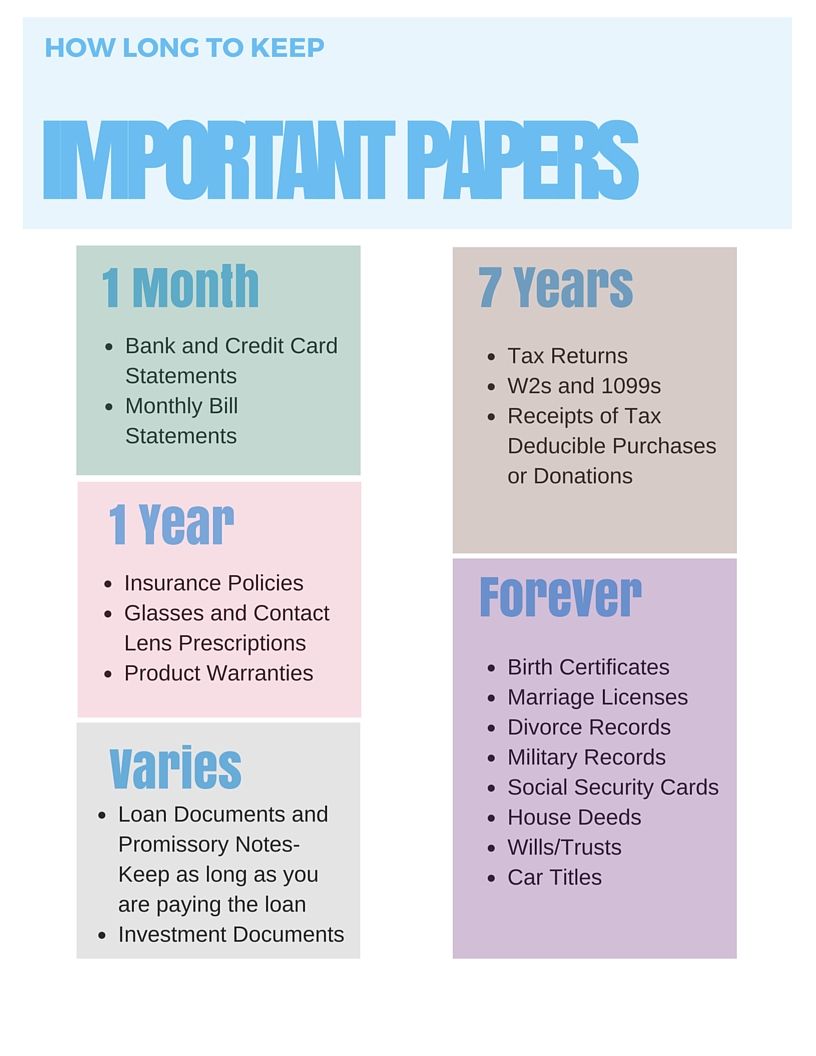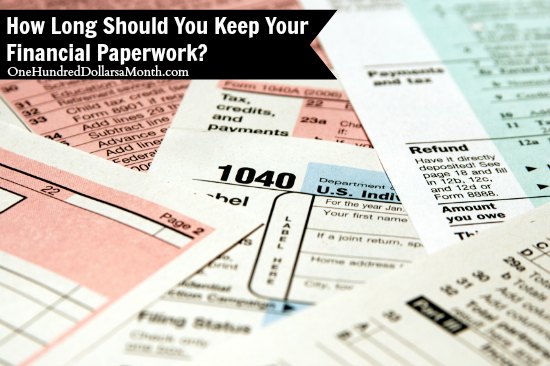Essential Paperwork: What to Keep and For How Long

Managing personal paperwork can seem like a daunting task. With the influx of documents from bills, financial statements, tax returns, and more, deciding what to keep and for how long is essential for both legal and practical reasons. In this post, we'll explore the key categories of paperwork, why you should keep them, and how long you should hold onto them. This guide will help you organize your documents efficiently and ensure you're prepared for financial audits, legal inquiries, or simple record-keeping.
Why Keeping Paperwork Matters

The significance of retaining paperwork extends beyond mere compliance with legal requirements; it serves as a robust defense against disputes, aids in financial planning, and provides peace of mind:
- Legal Compliance: Many documents are required by law to be retained for specific periods.
- Financial Audits: Tax authorities or financial institutions might audit your records.
- Dispute Resolution: Documentation can be critical when resolving disputes with vendors, employers, or service providers.
- Planning: Keeping records helps in assessing your financial health over time.
Financial Paperwork

Financial documents are some of the most critical items to retain:
Tax Returns and Related Documents

The Internal Revenue Service (IRS) recommends keeping tax returns and supporting documentation for:
- 3 Years: If you claimed a credit or refund after filing your original return.
- 6 Years: If you’ve underreported your income by more than 25%.
- Indefinitely: If you did not file a return or if the IRS suspects you filed a fraudulent return.
Here are the documents to retain:
- Bank Statements
- 1099 Forms
- W-2 Forms
- Receipts for charitable contributions
- Documentation for significant purchases or business expenses
- Home improvement records (can affect tax basis for sale)
It’s advisable to keep tax records digitally or in a secure physical file.
Bank Statements

Keep bank statements for:
- 1 Year: If you reconcile your accounts frequently or have easy access to online statements.
- 3 Years: For potential audit or proof of transactions.
If you are self-employed or need to prove income for credit applications, retain statements longer.
Credit Card Statements

Most credit card statements can be disposed of after:
- 1 Month: After verification, if you have online access and regularly reconcile your account.
- 1 Year: For identifying fraudulent charges, recurring subscriptions, or significant purchases.
- 7 Years: For credit card bills used for tax deductions (e.g., business expenses).
Property and Real Estate

Documents related to property transactions need to be kept for a long time due to their importance:
Deeds and Titles

Keep indefinitely to prove ownership and for future sales or estate planning.
Home Purchase and Sale Documents

Retain:
- Closing Statements
- Mortgage Documents
- Home Inspection Reports
- Loan Agreements
- Title Insurance Policies
These should be kept indefinitely or for as long as you own the property.
Home Improvements

Retain receipts and contracts:
- Indefinitely: To track the cost basis of your home for tax purposes when you sell.
- 7 Years: If you used them for tax deductions.
Healthcare Documents

Medical records and bills should be kept:
- 1 Year: Monthly statements for verification.
- 7 Years: Detailed medical bills, especially if used for tax purposes or for health-related claims.
Insurance Policies

Maintain copies of:
- Homeowners/Renters Insurance
- Life Insurance
- Health Insurance
- Auto Insurance
Most insurance policies can be kept:
- Until Renewal: For current policies.
- 7 Years: For significant claims or if they result in tax deductions.
- Indefinitely: For life insurance policies.
Employment Records

Employment-related documents such as pay stubs, contracts, performance reviews, and termination agreements should be kept:
- 1 Year: To verify wages, benefits, or for immediate reference.
- 7 Years: If related to taxes or legal issues.
Retain any documents pertaining to retirement plans or stock options indefinitely.
Legal Documents

Vital records like birth, marriage, divorce, and death certificates should be kept indefinitely. Legal documents such as:
- Wills
- Trusts
- Powers of Attorney
- Adoption Papers
should be retained indefinitely or updated as circumstances change.
Digital vs. Paper Storage

With the digital age upon us, document storage can be simplified:
- Digital: Scan documents and store them securely online or on an encrypted external drive.
- Physical: Use a fireproof safe or safety deposit box for irreplaceable originals.
💡 Note: Always ensure you have secure and regular backups for digital records.
To summarize, retaining the right paperwork for the appropriate amount of time is crucial for legal, financial, and personal reasons. Here are the key takeaways:
- Tax documents should be kept for a minimum of 3 to 7 years, with some needing indefinite retention.
- Financial records like bank statements can be kept for 1 to 3 years, but keep receipts for tax-deductible expenses for 7 years.
- Property-related documents should be retained indefinitely or until you sell the property.
- Medical bills and related documents should be kept for at least 1 year, extending to 7 if tax-deductible or for health claims.
- Employment records should be kept for 1 to 7 years, depending on their use.
- Legal documents such as wills, trusts, and personal records should be held indefinitely.
Organize these documents in an accessible manner, ensuring you have backups in both physical and digital forms. By understanding the retention periods, you can declutter your home, stay compliant with laws, and protect yourself in case of audits or disputes.
Can I shred old tax documents after 7 years?

+
Yes, you can shred tax documents after 7 years if there are no ongoing disputes or issues with the IRS related to those years. However, keep in mind that for certain situations, like fraudulent returns or if you did not file a return, records should be kept indefinitely.
What should I do with documents I no longer need to keep?

+
Shred or safely dispose of them to protect against identity theft. If you have important information on paper, consider recycling or composting. For digital documents, ensure secure deletion or encrypted erasure.
How can I secure my digital documents?

+
Use encryption, cloud storage with strong security measures, and regularly backup your data. Consider using secure password managers and enable two-factor authentication for your digital storage solutions.



